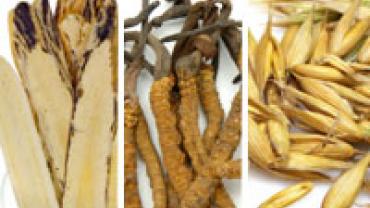
"
Adaptogens are plants that help the body maintain homeostasis and balance in primarily the endocrine neurotransmitter and hormonal systems. Recent research into stress has proven the important functions and usefulness of these plants. Under stress humans release hormones and neurotransmitters that trigger a fight or flight response. Under constant stress the adrenal glands (which produce cortisol giving our bodies a shot of energy) can eventually burn out leading to a response system that can no longer adequately answer to emergency stimuli.
This is where adaptogens come in. Russian scientists discovered that certain plants had the ability to resist chemical and biological stressors capable of adapting to change and thereby passing those properties on to humans. In general adaptogens have been shown to improve mental performance and physical endurance and help mitigate depression and anxiety by elevating mood.
Rhodiola rosea
For instance the plant Rhodiola rosea grows in the cold rocky high altitude and inhospitable regions of the northern hemisphere forcing the plant to adapt and thrive in an environment where most plants can't and indeed don't inhabit.
The primary family of active compounds found in rhodiola is called rosavin and is thought to exert its effects on the central nervous system by acting on monoamines such as serotonin and dopamine by inhibiting the enzyme responsible for the neurotransmitter's degradation. Rhodiola also interacts with the HPA (hypothalamus pituitary adrenal) axis thus having a direct effect on adrenal health.
Siberian ginseng
Eleutherococcus senticosus or Siberian ginseng is another adaptogen found as the name suggests in another inhospitable part of the world. While eleutherococcus demonstrates both improved mood and physical endurance when used together with rhodiola they were shown to also enhance life span.
Eleutherococcus also shows neuroprotective properties. In models of cerebral ischemia the adaptogen was shown to inhibit neuronal cell damage and death through inhibition of COX-2 expression while improving post-ischemic memory loss in affected lab animals.
Eleuthro's anti-stress properties appear to stem from its ability to modulate cortisol production a primary mechanism of action of most adaptogenic plants.
Ashwagandha
Withania somnifera or ashwagandha as it is known in Ayurvedic medicine has strong evidence to support its use as a mood stabilizer and anxiolytic (reducing anxiety). In lab animals involved in stress-producing activities ashwagandha was shown to have similar anxiolytic properties to the medication lorazepam. Many studies have also detailed other properties of ashwagandha including anti-cancer anti-inflammatory and immunomodulatory.
Cordyceps
Finally cordyceps one of the better known traditional Chinese medicines is a fungus which actually grows on the larva of a certain caterpillar. I have written about this unique fungus in past blogs and I'll state once again it is one of my overall favorite compounds as it has myriad properties and applications. Cordyceps appear to have great promise in the application of asthma as it balances Th-1/Th-2 immunity while also demonstrating decreases in airway inflammation.
Additionally in a separate study evaluating a different application cordyceps improved exercise endurance by modulating the expression of a variety of genes associated with endurance and oxidation.
As a class of medicinal herbs/plants the adaptogens can be incredibly effective tonics for those suffering from a variety of conditions including cardiovascular issues chronic fatigue and fibromyalgia adrenal exhaustion chronic depression and oncological applications or for those simply looking to improve physical and mental endurance and stamina.
by Michael Fuhrman D.C.